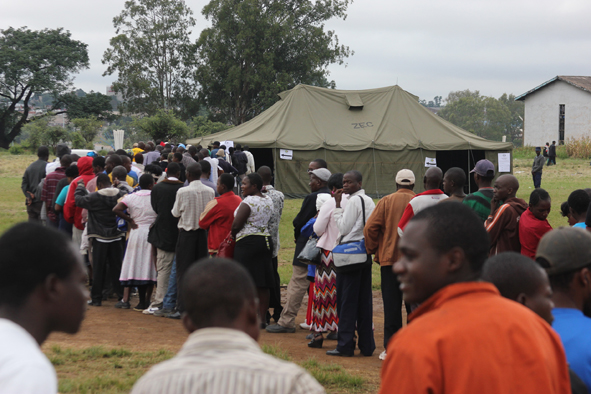
Prime Minister Morgan Tsvangirai last week predicted a landslide victory for his party in the impending harmonised elections.
NewsDay Editorial
Speaking on the campaign trail in Bubi constituency last Friday, the MDC-T leader told his supporters that the mood in the country was “overwhelmingly anti-Zanu PF” and that Zimbabweans “will not vote for a dark past, but for a bright future which lies in the hands of the MDC-T”.
Tsvangirai is right about the anti-Zanu PF sentiment pervading the political landscape. He is also correct that Zimbabweans are keen to have a new leadership that will extricate the nation from the current morass.
The MDC-T boss should, however, be circumspect about his party’s chances in the elections, as he is not only coming up against a wily President Robert Mugabe, who still has at his disposal State machinery to manipulate the electoral process and impair the results.
Tsvangirai should also make judicious evaluation of his parties performance as a facet of the inclusive government since its formation four years ago.
His ministers have in many instances failed to bring sea change in public administration. They have not been different from denizens of the retrogressive dark past. MDC-T ministers in charge of Water and Energy, for example, have failed to use their combined influence to electrify pump stations at Mtshabezi Dam critical to Bulawayo’s water provision.
The MDC-T’s commitment to reform has been questionable at times as the party has nodded through disastrous policies effected by the inclusive government.
- Chamisa under fire over US$120K donation
- Mavhunga puts DeMbare into Chibuku quarterfinals
- Pension funds bet on Cabora Bassa oilfields
- Councils defy govt fire tender directive
Keep Reading
On the eve of these harmonised elections, the party has awakened to the outstanding legislative agenda which includes media reform, reforming the security establishment, ensuring professionalism in the conduct of the Registrar-General and protection of fundamental rights. It could be too late.
More critically, dozens of MDC-T MPs who won in the former Zanu PF rural strongholds in 2008, have done very little to grow their support base, electing to sit back, buoyed by the belief that the grind of hardships is creating an anti-Zanu PF sentiment in the constituencies.
There is no real evidence on the ground at the moment that the MDC-T has grown its support base in these constituencies to guarantee the party a landslide victory.
The so-called “overwhelmingly anti-Zanu PF” sentiment may not be enough to see the MDC-T home in these elections because the party still has to demonstrate organisational aptitude to counter Zanu PF’s chicanery in the conduct of elections.
Tsvangirai should be reminded that what Zanu PF has lost on the ground, the State bureaucracy can recover through manipulating the electoral process and application of the tried and tested intimidation matrix by securocrats.
The current voter registration fiasco is ample demonstration of Zanu PF’s control of processes. What is Tsvangirai’s response to the disenfranchisement of thousands of his supporters?
Zimbabweans are looking for a leader whose industry and ingenuity can provide an alternative to Zanu PF’s failed policies.
This is what we want to hear from the MDC-T; how the party will sort out, energy shortages, crumbling infrastructure, failing health system and grand corruption in both the public and private sector.
The anti-Zanu PF mood is not a safe passage to State House, Morgan.











